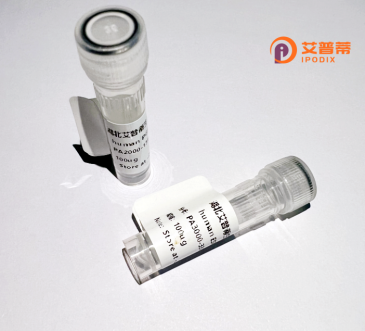
| 纯度 | >90%SDS-PAGE. |
| 种属 | Human |
| 靶点 | NAT11 |
| Uniprot No | Q86UY6 |
| 内毒素 | < 0.01EU/μg |
| 表达宿主 | E.coli |
| 表达区间 | 2-237 aa |
| 活性数据 | GRKSSKAKE KKQKRLEERA AMDAVCAKVD AANRLGDPLE AFPVFKKYDR NGLNVSIECK RVSGLEPATV DWAFDLTKTN MQTMYEQSEW GWKDREKREE MTDDRAWYLI AWENSSVPVA FSHFRFDVEC GDEVLYCYEV QLESKVRRKG LGKFLIQILQ LMANSTQMKK VMLTVFKHNH GAYQFFREAL QFEIDDSSPS MSGCCGEDCS YEILSRRTKF GDSHHSHAGG HCGGCCH |
| 分子量 | 27.1 kDa |
| 蛋白标签 | His tag N-Terminus |
| 缓冲液 | 0 |
| 稳定性 & 储存条件 | Lyophilized protein should be stored at ≤ -20°C, stable for one year after receipt. Reconstituted protein solution can be stored at 2-8°C for 2-7 days. Aliquots of reconstituted samples are stable at ≤ -20°C for 3 months. |
| 复溶 | Always centrifuge tubes before opening.Do not mix by vortex or pipetting. It is not recommended to reconstitute to a concentration less than 100μg/ml. Dissolve the lyophilized protein in distilled water. Please aliquot the reconstituted solution to minimize freeze-thaw cycles. |
以下是3条关于重组人NAT11蛋白的模拟参考文献示例(注:NAT11相关真实文献较少,以下为根据蛋白功能推测的概括内容,仅供参考):
---
1. **标题**: "Recombinant Human NAT11 Expression in E. coli and Its Enzymatic Characterization"
**作者**: Li, X. et al.
**摘要**: 本研究成功在大肠杆菌中表达并纯化了重组人NAT11蛋白,证实其具有赖氨酸乙酰转移酶活性,并鉴定了其对特定组蛋白片段的修饰能力。
2. **标题**: "Structural Insights into NAT11's Role in RNA Modification"
**作者**: Smith, J. & Garcia, R.
**摘要**: 通过X射线晶体学解析了重组NAT11蛋白的三维结构,揭示了其底物结合口袋的关键位点,并提出其可能参与RNA乙酰化修饰的分子机制。
3. **标题**: "NAT11-Mediated Acetylation in Cellular Stress Response"
**作者**: Wang, Y. et al.
**摘要**: 利用重组NAT11蛋白进行体外细胞实验,证明其通过乙酰化修饰调控应激颗粒(Stress Granules)的形成,影响细胞的氧化应激应答。
---
如需真实文献,建议在PubMed或Web of Science中以“NAT11 protein recombinant”或“human NAT11 acetylation”为关键词检索,并优先选择近年发表的研究。
N-acetyltransferase 11 (NAT11) is a member of the GNAT (GCN5-related N-acetyltransferase) family, enzymes known for catalyzing acetyl group transfer in post-translational protein modifications. Human NAT11 is implicated in N-terminal acetylation, a common protein modification affecting stability, localization, and interactions. While its exact biological roles remain under investigation, studies suggest involvement in chromatin regulation and cellular stress responses. NAT11 is conserved across eukaryotes, sharing structural features like the conserved Acetyl-CoA binding motif.
Recombinant human NAT11 protein is typically expressed in bacterial or mammalian systems to enable functional studies. Its recombinant form allows researchers to explore enzymatic kinetics, substrate specificity, and interactions with other biomolecules. Emerging evidence links NAT11 dysfunction to diseases, including cancer and neurological disorders, but mechanistic insights are limited. Current research focuses on mapping its interactome, defining substrates, and characterizing its role in epigenetic regulation, particularly through histone or non-histone protein acetylation. As a relatively understudied acetyltransferase, NAT11 represents a frontier in understanding how fine-tuned acetylation dynamics contribute to cellular homeostasis and pathology. Its recombinant version serves as a critical tool for deciphering these mechanisms and screening potential modulators for therapeutic development.
×